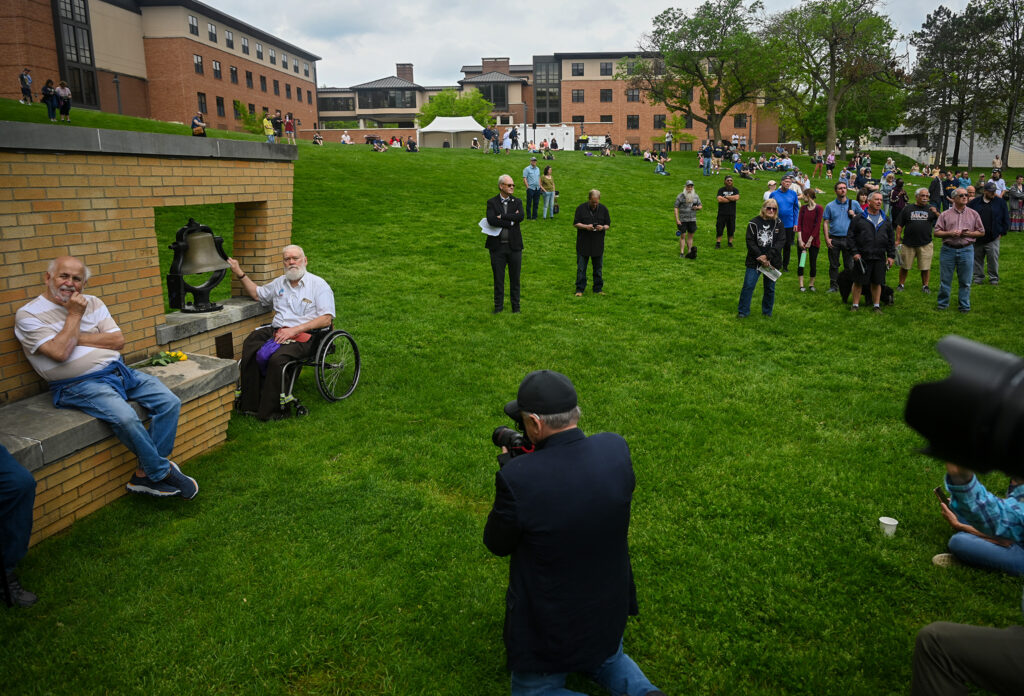After their son William had been shot and killed by Ohio National Guard troops at Kent State University on May 4, 1970, Florence and Louis Schroeder received a letter at their Lorain, Ohio, home.
“There’s nothing better than a dead, destructive, riot-making communist,” it read, “and that’s what your son was …. Be thankful he is gone.”
The letter writer wasn’t alone in his distaste for those killed during a protest by students angered that President Richard Nixon had expanded the Vietnam War into Cambodia.
Karl Liske worked at the Kent post office at the time. In an oral history recorded in 2019, he recalled nearly coming to blows with a coworker who said Guardsmen “should have shot more of them.”
In fact, the university’s oral history project is filled with such recollections. Kent State students returned home shaken by what they’d seen and experienced only to be cursed out by friends and family members who cheered the National Guardsmen’s treatment of protesters. “Oh, I wish I would have shot them,” one student recalled hearing from a relative. “If I’d been there, I would have shot them all.”
Attitudes changed over time. More than eight years after the shootings, Guardsmen named in a civil suit signed a statement that read, “In retrospect, the tragedy of May 4, 1970, should not have occurred …. Hindsight suggests that another method would have resolved the confrontation. Better ways must be found to deal with such confrontations.”
Nixon’s own Scranton Commission concluded that “the 61 shots by 28 Guardsmen certainly cannot be justified.”
Saturday marked the passing of 54 years since the shootings. In a parking lot that was in the line of the Guardsmen’s fire, people solemnly approached four small memorial markers where the Kent State students died.
“We remember Bill,” someone had written in chalk near Schroeder’s memorial. Schroeder fell after a bullet fired from an M1 military rifle ripped into his chest and tore up a lung.
Several feet away, at the spot where Allison Krause died, a blue chalk quote on the parking lot elicited a sigh: “Those who don’t remember history are destined to repeat it.” And then, “Activists don’t deserve to die.”
On a day set aside to remember when escalation led to a tragedy of historic proportions, New York City police were taking heat after acknowledging that one of its officers accidentally fired a gun while clearing pro-Palestinian protesters from a building on the Columbia University campus.
At Kent State, past lessons coexisted with present tensions. A middle-aged man wearing a blue jean jacket picked up a piece of yellow chalk and wrote near the Allison Krause memorial marker, “Palestinian Solidarity.” And on the nearby Commons, where several hundred people gathered for a commemoration ceremony, a choir director wore a T-shirt that read “Jews say cease fire now” while leading a group of students in singing the Neil Young song “Ohio.”
Pro-Palestinian protesters at the event stood quietly and clutched signs. “Wrong in Vietnam, wrong in Gaza,” read one. And another: “Honor our legacy, disinvest now.” On a hillside overlooking the event, counterprotesters displayed two large flags of Israel.

After the choir finished, a gray-bearded man named Dean Kahler pushed his wheelchair to the university’s famous Victory Bell. Kahler was a 19-year-old freshman when a Guardsman’s bullet damaged his spine. That was decades ago. Now it was time to honor the dead. Kahler reached up and sent the bell’s sharp, resonant call out over the Commons. It sounded like a warning.
Steve is a photojournalist and writer for the Pittsburgh Post-Gazette, but he is currently on strike and working as a Union Progress co-editor. Reach him at smellon@unionprogress.com.



